Then vs. Than
What is the difference?
In this lesson, we will be going over a pair of words that even native English speakers often have trouble using correctly. The two words are then and than. They both look and sound very much alike, so it can be hard to know when to use one vs. the other, but it is very important that you do know the difference, because they have different meanings.
One means "at that time," or at a specific time that you are already talking about, and the other is used in sentences comparing two things.
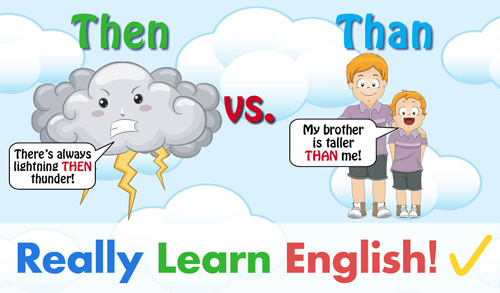
Click Here for Step-by-Step Rules, Stories and Exercises to Practice All English Tenses
Then
The first word that we will be learning about is then, which is an adverb with several possible definitions.
The first way that you can use then is to mean "at that time," or at a specific time that you are talking about. Let's see a few examples of this definition used in a sentence.
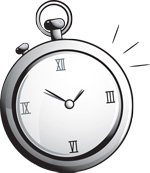
Examples:
- When the clock strikes noon, we can go and eat lunch then.
(When the clock strikes noon, we can go and eat lunch at that time.)
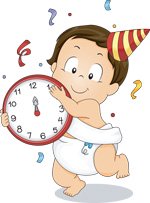
- Jessica has a doctor's appointment later today, only then will she know why she feels sick.
(Jessica has a doctor's appointment later today, only at that time will she know why she feels sick.)

- My favorite decade was the 1970's, because the music was so much better back then.
(My favorite decade was the 1970's, because the music was so much better back during that time.)

Then can also mean "next," or "also." Here are some examples of then used in this way.
Examples:
- Mark will eat his dinner first, then he will eat his dessert.
(Mark will eat his dinner first, and after that he will eat his dessert.)

- There was a flash of lightning, then there was the sound of thunder.
(There was a flash of lightning, next there was the sound of thunder.)
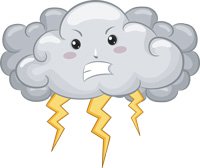
- I need to clean out the garage right now, then I will take a shower and relax. (I need to clean out the garage right now, after that I will take a shower and relax.)

Another definition for then is "therefore," or in other words, it is used to express that one thing follows another in a list or that one thing causes another. Sentences where then is used in this way often begin with the word "if." Let's see a few more examples to help you understand.
Examples:
- If you give me your hat, then I will tell you my secret.
(If you give me your hat, the result will be that I tell you my secret.)

- If Thomas is going to be at the party, then I am not going.
(If Thomas is going to be at the party, because of that I will not be going.

- If you are unable to clean your room tonight, you can just do it tomorrow, then.
(If you are unable to clean your room tonight, you can just do it tomorrow, in that case.)

Than
The second word that we are going over in this lesson is than, which is a conjunction and preposition. Than also has several possible meanings.
The first meaning of than is to introduce the second thing in a sentence that is comparing two things. Let's see a few examples to give you a better idea of when to use than in this way.

Examples:
- I would rather have chicken for lunch than fish.
(Would rather have chicken for lunch instead of fish.)

- Evan is much taller than his brother, Lance.
(Evan is much taller in comparison to his brother, Lance.)
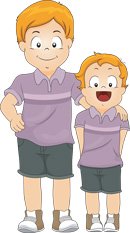
- There are more people on Earth now than there have ever been in history.
(There are more people on Earth now compared to any other time in history.)

Another way that you can use than is to express an exception to a statement. When used in this way, than is often written or said with the word "other" before it. Here are a few examples to help you understand this definition.
Examples:
- Other than my goldfish, I do not have any pets.
(With the exception of my goldfish, I do not have any pets.)

- Tina needs to eat something other than candy if she wants to be healthy.
(Tina needs to eat something instead of candy if she wants to be healthy.)
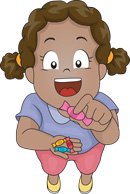
- There was nobody, other than Carol, in the movie theater.
(There was nobody, with the exception of Carol, in the movie theater.)

Collocations
To better understand how to correctly use then and than when you are speaking or writing in English, it helps to know common words that go along with each of them.
One collocation that we already went over is "other than," which is used when than is meant to express that something is an exception to a specific statement.
Two other collocations that you should know are "more than" and "less than," which are both used when making comparisons.
Another common phrase is "then again," which is used to introduce a second statement that is in contrast to one that came before it.
More Tips
Now you know that then means "at that time," and than means that there is one thing begin compared to another! Even though you probably know each word pretty well now, it might still be hard sometimes to remember which one is which. There are even many native English speakers who mix the two words up.
A good way to remember when to use then and when to use than is to use this little trick. Then has an "e" in it and than has an "a," so when you see the "a" think "a comparison,." And when you see the "e," remember that it makes the word "the" if you leave the "n" off the end. So when you see that, you can think "the time."
With those two tricks to help you remember when to use then and when to use than, you should have no problem telling the two apart!

A Story to Practice Then vs. Than
Heather bakes a loaf of bread for dinner, then she cooks some meat as well. If she turns the oven temperature up too high, then it will burn, so she is very careful. Heather likes meat more than bread, but she thinks that bread is healthier for her than meat. Heather needs to do the dishes, and then she will be able to relax until the food is ready to eat.
Other than Heather, there is no one home right now. Her roommate is coming home at six o'clock, then she will not be alone anymore. Before her roommate gets back, Heather wants to read a magazine, then find some flowers from outside, then call her mother and talk. She does not think that she has enough time to do everything, but then again, she is a very fast reader. If she starts now, then she can probably finish everything in time.
Her roommate comes home earlier than usual, and Heather does not get to call her mother. She will just do it tomorrow instead, then. Her roommate asks what is for dinner, then walks into the kitchen. Heather says that there is meat and bread and if she wants some, then she can have it. Her roommate says that there is nothing she would rather do than eat dinner right now.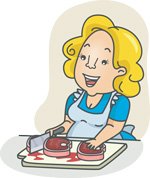
Quiz
Fill in the blanks with the appropriate word. Each question is worth ten points.
- We had to go to the store first, and _________ (then/than) back to our house.
- If Chuck is going to be rude to me, _________ (then/than) I am not going to speak to him.
- There is no one at the beach today, other _________ (then/than) me and my family.
- I have much more water _________ (then/than) I need, so you can have some.
- I would rather live in the mountains _________ (then/than) near the ocean.
- I will go first, _________ (then/than) you will get a turn to play.
- If Tracy does not finish all of her food, I can eat the rest of it _________ (then/than)?
- When Hank gets back from work, _________ (then/than) everyone will be home.
- The book that I am reading now is better _________ (then/than) the one I read before it.
- There is no one who likes dogs more _________ (then/than) Elise.
Answer Key
1. then | 2. then | 3. than | 4. than | 5. than | 6. Then | 7.then | 8. then | 9. than | 10. than
Get Updates, Special Offers, and English Resources
Download your FREE GIFT (the first two chapters of
English Short Stories Book and Workbook)
as soon as you join!

By submitting your email, you consent to receiving updates and newsletters from us and to the sharing of your personal data with third parties for the purposes of sending you communications. We will not spam you. You can unsubscribe at any time. For more information, please see our privacy policy.


